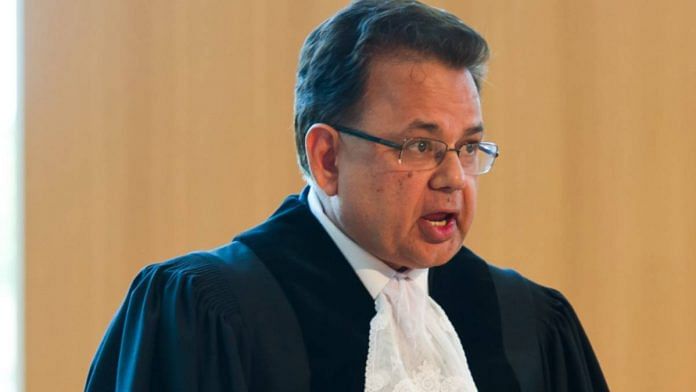New Delhi: Justice Dalveer Bhandari, the Indian judge in the International Court of Justice (ICJ) in The Hague, was among the 13 judges who asked Russia to immediately stop its military offensive in Ukraine Wednesday.
Bhandari was one of the two judges at the world court whose vote is contrary to their respective countries’ stance at the United Nations General Assembly (UNGA).
“The Russian Federation shall immediately suspend military operations that it commenced on 24 February on the territory of Ukraine,” presiding judge Joan Donoghue announced.
At the United Nations (UN), India’s stand has been that diplomacy and dialogue are the solutions to the conflict between Russia and Ukraine. At the UN General Assembly on 2 March, India urged both sides to focus on diplomacy to end the war and abstained from voting on the matter.
Diplomatic sources told ThePrint that the process of voting at the ICJ is different from the way issues concerning war and peace are dealt with at the UN, and the way specific resolutions are handled.
“Unlike in the UN, in the ICJ, there is no option of abstention. If the Russians are upset with this move, let them be,” a source said.
Arindam Bagchi, spokesperson for the Ministry of External Affairs, said at a media briefing Thursday that “ICJ judges vote in their individual capacities and they vote on the merits of that”.
Others familiar with the ICJ’s functioning echoed Bagchi, saying that a judge’s opinion at the world court is in his or her individual capacity, and does not reflect their respective countries’ stand on the issue.
“Justice Bhandari is in ICJ as an independent judge. His orders there do not speak for India’s opinion on international issues. As a world court, ICJ settles in accordance with international law the disputes submitted to it by States, which have agreed to submit themselves to its jurisdiction,” said another source.
Also read: Reports of progress in peace talks ‘wrong’, Ukraine ‘in no rush’ for deal, claims Kremlin
The vote at ICJ
By a majority of 13:2, the world court observed in its verdict that it was “profoundly concerned about the use of force by the Russian Federation which raises very serious issues in international law”.
Though the verdict asked Russia to cease military operations immediately, a unanimous direction was also issued. The world court directed both Ukraine and Russia to ensure that they refrain from any action which can aggravate or extend the dispute in court.
The ICJ’s pronouncement on provisional measures came on Ukraine’s petition under the Genocide Convention, and was delivered even as the Russian Federation remained absent.
Apart from Justice Bhandari, those who voted against the Russian offensive were judges from the US, Australia, Germany, Japan, Slovakia, Morocco, France, Brazil, Somalia, Uganda, Jamaica and Lebanon.
The judge from China, Xue Hanqin, supported dissenting ICJ Vice-President Kirill Gevorgian, who is from Russia.
Along with Justice Bhandari, judge Julia Sebutinde from Uganda too voted in line with the majority view at ICJ, while her country had abstained at the UNGA on 2 March.
Even China had abstained from voting at the UN. However, its ICJ member Hanqin delivered an opinion against the ICJ verdict calling for immediate suspension of military operations by Russia.
Bagchi, when asked about “Indian judge” Bhandari’s vote and India’s abstentions from the UN resolutions, added: “We have abstained from voting on certain resolutions in certain organisations based on the text that is on the table. Our position has been clarified on various occasions through explanation of votes which highlights various aspects which are very nuanced.”
He also said that calling Justice Bhandari “India’s judge” is a “loose use of the words in English… I think he happens to be an Indian national who is a member in his individual capacity at the ICJ”.
Justice Bhandari’s ‘eventful’ election
Justice Bhandari, who is serving his second term at the ICJ, was sworn-in as a judge there on 19 June 2012, when the Congress-led UPA was in power at the Centre.
He was appointed to a seat that got vacant at the ICJ and ballots for his election were simultaneously polled in both the UN General Assembly and the UN Security Council.
In July 2017, India renominated Justice Bhandari at the world court, months before his six-year-term was about to end in February 2018. This time, however, Justice Bhandari faced stiff competition, with the UK doing everything possible to push its candidate, Christopher Greenwood.
At 70, Justice Bhandari was re-elected to the world court, securing 183 of the 193 votes in the UNGA and all 15 in the Security Council, forcing the UK to withdraw its candidate.
Given that there were 11 rounds of voting, Justice Bhandari had then termed his re-election as “more eventful” than the 2012 one, because it was the first time he witnessed an election to the world court.
According to a book by Syed Akbaruddin, who was India’s permanent representative to the UN in New York, Justice Bhandari’s election was “unique” and an “unprecedented” diplomatic win for India over the UK.
Justice Bhandari’s second stint as ICJ judge ends in February 2027. He has become the fourth Indian to be a permanent ICJ judge. The other three were Sir Benegal Rau, Nagendra Singh and RS Pathak. Notably, Nagendra Singh is the only Indian who served as president of ICJ from 1985 to 1988.
(Edited by Nida Fatima Siddiqui)
Also read: Putin vows to cleanse country of ‘scum and traitors’, accuses West of trying to destroy Russia



